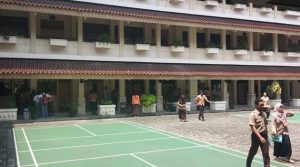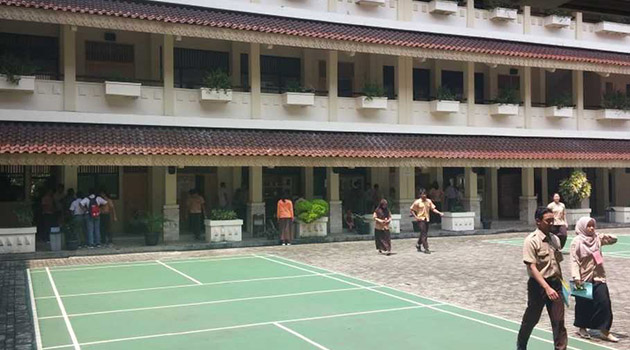How Elite Sports School in Ragunan Grooms Indonesia’s Top Athletes

Since Egy Maulana Vikri, Indonesia’s football wonderkid, was signed by Poland’s top-tier club Lechia Gdansk in March, more attention has been paid to SKO Ragunan in Jakarta, a state-run sports school, which groomed the young player.
When Egy flew to Poland to sign a three-year contract, many realized he was not affiliated with any professional club, and all his experience came from the school where he has spent the past three and a half years.
The “SKO” stands for “sekolah khusus olahragawan.” The school’s full name can be translated as Ragunan Elite Sports School.
SKO Ragunan was established in 1977, and has since produced the country’s top athletes, including badminton Olympic gold medalists Susi Susanti and Alan Budikusuma, top tennis player Yayuk Basuki, and national football team’s goalkeeper Andritany Ardhiyasa, midfielder Muhammad Hargianto.
More than 500 students, aged 12 to 17 years old, live in dormitories at the school’s complex. Strict rules apply. They can hangout and relax only if special leave is granted to them, and this does not happen too often.
When the Jakarta Globe met with the school’s headmaster, Suharsono, on Wednesday afternoon (11/04), a student was asking for leave.
“They are not allowed to go outside without permission. If we grant it, they must fill out a form,” Suharsono said, adding that how much time off a student can take depends on his or her coaches and training program.
Most of the students can only met their parents once a year during Idul Fitri, the holiday marking the end of the Muslim fasting month of Ramadan.
“When you ask them about their parents, their eyes will tell you how much they miss their families … at their age, they still need parental care,” Suharsono said.
Some of the students were encouraged by their families to pursue a professional sports career. But it comes with a sacrifice. Instead of playing and spending their time like typical teenagers, SKO Ragunan students have to work for their ambitious dreams to come true.
“My mom pushed me to become an athlete,” Dian Firza Amdila, a 17-year-old volleyball player from East Java, told the Jakarta Globe.
She started to play volleyball at the age of 11, when she joined a sports club. She came to Ragunan for senior high school exams and was admitted.
She says that if she does not become a top athlete, she wants to join the Indonesian Navy.
“Life at this school is different than at other schools. It’s tiring, but we really want to be elite athletes,” Dian said.
High Performance
The school’s complex covers 18 hectares in Ragunan, South Jakarta. It provides all facilities needed to teach and train 20 sports disciplines.
Students train five hours a day — two in the morning and three in the afternoon. Regular classes take only three hours, from 8:30 a.m. until lunch.
Eight paramedics and doctors are constantly on duty, responsible for the young athletes’ health and fitness, while caretakers at dormitories make sure they go to sleep on time.
“They wake up at the same time [5 a.m.], train at the same time, study at the same time and sleep at the same time,” Suharsono said, adding that if their performance drops, they may be expelled from the school.
“If it happens, we’ll assist them in finding a new school.”
When they graduate, most of the students either enter universities or become members of the National Police or the Indonesian Military (TNI).
“I’d be brokenhearted if I see my former students working as tofu sellers or doing any blue-collar jobs,” Suharsono said.
Funding
The Ragunan school is funded by the Ministry of Education, the Ministry of Sports, and the provincial administration of Jakarta through its sports agency known as Disorda DKI.
“When we talk about the academic curriculum, the Ministry of Education is responsible for it,” Suharsono said, revealing that the academic budget is Rp 140 million ($10,178) a year.
“When we talk about sports, then the Ministry of Sports and the Disorda cover it.”
According to the ministry’s official, Teguh Raharjo, more than Rp 20 billion ($1.4 million) goes to SKO Ragunan annually for sports-related activities.
From the ministry’s budget SKO Ragunan maintains its dorms, coaches and even buys school clothing.
There is no tuition fee. Each student receives a monthly allowance of Rp 1.5 million, if he or she is sponsored by Disorda, or Rp 1 million, if their scholarship comes from the ministry.
“We also have different canteens for those from Disorda and those from the Ministry of Sports,” Suharsono said.
Sports Education in Indonesia
There are only 16 sports schools of the SKO Ragunan kind in the whole country. The latter is not only the first, but has also been considered the best, as it teaches 20 disciplines.
“We have other schools like this in other regions, but they usually don’t have that many sports available,” Suharsono said.
Each province and almost every district has its Learning and Training Center for Students, also known as PPLP and PPLM. The PPLP is designated for talented athletes aged 18 years old or younger, while those between 18 and 22 train at the PPLM. Their students, however, attend normal schools and do not receive as much supervision and guidance as those at SKOs.
Courtesy : Jakarta Globe
[social_warfare buttons=”Facebook,Pinterest,LinkedIn,Twitter,Total”]



